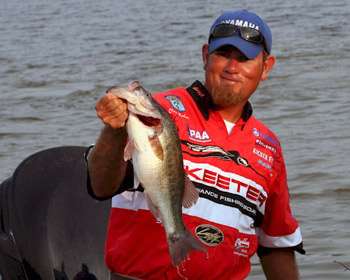
Elite Angler Clark Reehm may not look particularly buff, but under duress he's been known to perform superhuman feats of strength, lifting boats off mudflats and push poling those same boats down hundreds of yards of what often turn out to be dead end canals.
He doesn't do it for the health benefits — it's all about finding populations of fish that the competition overlooks. "It's almost always a viable option," he says. "The only time I don't really worry about it is on a place like Kentucky Lake, during times when the fish are all offshore.
River systems are perfect places to look for something different, fishing spots that others can't get into or give up too easily." Last year on Florida's Lake Kissimmee, he found a 150-yard drainage ditch running through farmland that was "just wide enough to get a boat down.
It never opened up but it was just loaded with fish." He milked the spot for all it was worth. In some cases, a place like that might only be good for one day's worth of fish. Other times, however, a backwater pond or canal, if managed properly, can last through a multi-day tournament, especially if an angler has it all to himself. Reehm cautions competitive anglers to check their tournament circuit's rules before they attempt to enter or leave an area by anything other than conventional means.
For example, BASS allows an angler to get out of the boat to exit an area, but not to gain access to it. But there are certain ways to enhance the likelihood that you'll be able to get in and out. In fact, Reehm often carries a variety of tools just for this very purpose. The first is a pruning saw, which can be used to cut brush or laydown logs that lie in the way.
Some anglers carry a chainsaw, but he doesn't go that far, and notes that his saw can be used underwater. He also packs a push pole wherever he goes and has spent time becoming adept with it. The third item he carries is less conventional — a long-handled toilet brush. "It helps me clear vegetation off the intake of my Yamaha outboard," he explains. When he's running his big motor in thick weeds, he stops occasionally to scrub the intake so the engine doesn't overheat."
Reehm also takes precautions against being stranded in a hard-to-reach area. He takes a long rope in case he has to ask someone to pull him off a sandbar or mudflat. Some of his friends use a "come-along" winch that they can strap to a tree for the same purpose. Ultimately, Reehm says you best tool is just good, common sense. That's especially true on tidal waters, where you must be able to use tide charts and understand how the tidal stages affect shallow access.
On non-tidal rivers and lakes that fluctuate, it's also fairly easy to predict when water levels are going to be lowered. One unfortunate fact about fishing such remote spots is that you may have to leave fish that are biting to avoid being stranded by low water. But no matter the obstacles or hurdles, Reehm spends at least part of just about every tournament practice looking for a group of fish off the beaten path — a population that's likely less-educated than the rest and that he'll have to himself.
Sometimes it pans out and his ditch opens up into a beautiful spring-fed pond. Other times, it's less productive. But on those occasions when he finds something along the lines of the first scenario he's likely to make it part of his game plan on tournament day. "I'm always going to take the risk," he says.
(Provided by Z3 Media)





